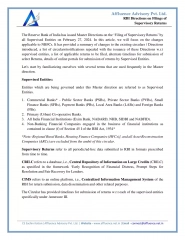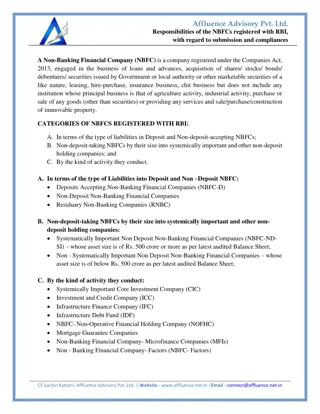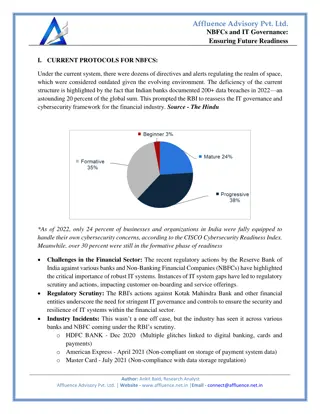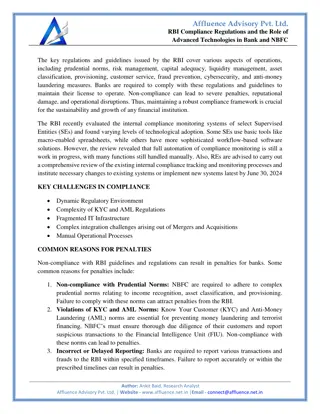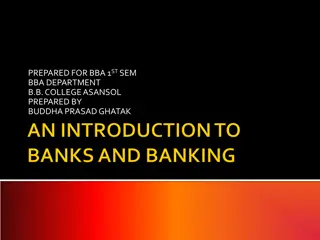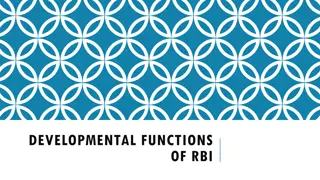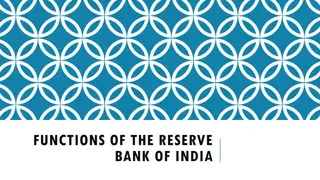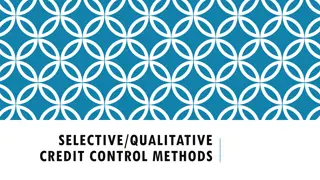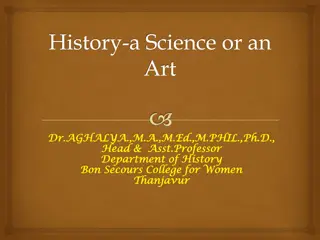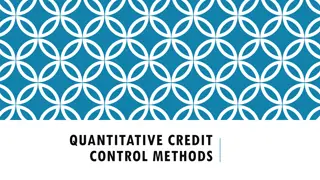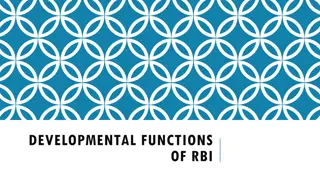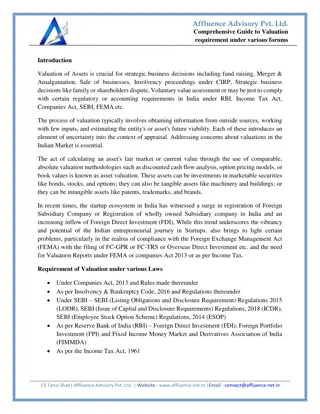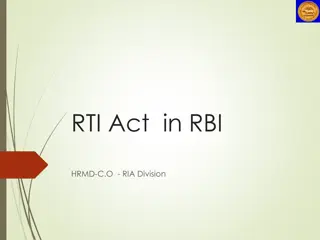RBI Directions on Filings of Supervisory Returns
RBI issues new Master Directions on 'Filing of Supervisory Returns,' emphasizing NBFCs. Timelines, revised applicability, and online portals introduced for streamlined filing. Physical submission required for Form A Certificate.
1 views • 5 slides
Responsibilities of the NBFCs registered with RBI, with regard to submission and compliances
India's regulatory framework for Non-Banking Financial Companies (NBFCs) under the RBI, covering prudential norms, compliance, penalties, and the shift to online filing via XBRL, highlighting the sector's emphasis on transparency, risk management, and technological integration.
1 views • 6 slides
Responsibilities of the NBFCs registered with RBI
India's regulatory framework for Non-Banking Financial Companies (NBFCs) under the RBI, covering prudential norms, compliance, penalties, and the shift to online filing via XBRL, highlighting the sector's emphasis on transparency, risk management, and technological integration.
2 views • 6 slides
Scale Based Regulation 2023 - Non-Banking Financial Company (NBFCs)
On October 19, 2023, the Reserve Bank of India (\u201cRBI\u201d) has issued \u2018Master Direction \u2013 Reserve Bank of India (Non-Banking Financial Company \u2013 Scale Based Regulation) Directions 2023\u2019 (\u2018SBR Master Direction\u2019). The SBR Master Direction aims to harmonize the Previ
0 views • 9 slides
Understanding Quantitative Credit Control Methods in RBI's Monetary Policy
RBI's monetary policy revolves around maintaining credit quantity in the market through quantitative credit control methods. This includes Bank Rate Policy, Open Market Operations, Cash Reserve Ratio (CRR), and Statutory Liquidity Ratio (SLR). These tools help regulate credit flow, liquidity, and ma
4 views • 8 slides
RBI
Reserve Bank of India(RBI)\nThe Reserve Bank of India(RBI) is the Controlling Institution of all Banks in India. It is formed by an Act. It\u2019s owned by the Indian government\u2019s Finance Ministry and takes care of things like inflation, interest rates, lending, and ensuring the financial stab
1 views • 5 slides
NPA Through Lens of RBI
Gain insights into non-performing asset management from the perspective of RBI through the experiences and expertise shared by CA Gopal Dhakan. Explore topics such as Bank Branch Audit, Neo Banking, Fee Structure Changes, and Reimbursement Policies, offering valuable information for professionals in
3 views • 43 slides
NBFCs and IT Governance-Ensuring Future Readiness
The RBI's regulations aim to ensure NBFCs uphold strong cybersecurity standards, safeguarding consumers and enhancing trust in the financial sector, particularly in light of recent incidents such as Paytm Payment ban (Jan 2024) due to significant KYC irregularities, deficiencies observed in loan san
6 views • 8 slides
Overview of Banking Institutions and Types
Banking institutions play a crucial role in the economy by accepting deposits from the public and providing financial services. They are classified into various types such as commercial banks, investment banks, cooperative banks, and central banks. Commercial banks cater to the working capital needs
1 views • 13 slides
RBI Compliance Regulations and the Role of Advanced Technologies in Bank
Technological solutions play a pivotal role in enhancing compliance management for NBFCs. By leveraging tech solutions for suspicious transaction detection, RPA for automating compliance tasks, blockchain for secure record-keeping, NLP for regulatory
0 views • 5 slides
Evolution of Reserve Bank of India: A Historical Overview
The Reserve Bank of India, established in 1935 and headquartered in Mumbai since 1937, has played a crucial role in India's financial landscape. From nationalization in 1949 to financial reforms in 2000, this summary covers key milestones in RBI's history, including regulatory expansions, nationaliz
0 views • 18 slides
Principles of History Taking in Clinical Assessment
History taking is a crucial process in patient assessment, aiding in determining the etiology of medical issues. Obtaining an accurate history through proper questioning, active listening, and maintaining a professional appearance is vital for making accurate diagnoses. The history should follow a s
1 views • 35 slides
Developmental Functions of Reserve Bank of India
Reserve Bank of India (RBI) plays a crucial role in promoting economic growth through various developmental functions. These include promoting agricultural finance, industrial finance, finance for exports, banking, and framing monetary policy. RBI works towards providing institutional credit to agri
0 views • 7 slides
Functions of the Reserve Bank of India
The Reserve Bank of India plays a crucial role in regulating the monetary system to achieve economic growth and stability. It performs traditional functions, including central banking functions like issuing currency, regulating credit, and acting as the banker's bank. The RBI's functions are categor
0 views • 11 slides
Understanding Sale of Stressed Loans: Accounting and Valuation
Explore the nuances of selling stressed loans including accounting treatment, valuation aspects, and motivations for transfer. Learn about stressed loans, RBI's asset classification norms, and considerations for both transferors and transferees in the sale process. The article delves into the implic
0 views • 17 slides
Qualitative Credit Control Methods Explained
Selective/Qualitative credit control methods involve regulating the quality and direction of credit flows by implementing controls such as ceilings on credit, margin requirements, discriminatory interest rates, directives, direct action, and moral suasion. These methods are used by central banks lik
0 views • 7 slides
Essential Skills for Musculoskeletal History Taking
History taking is crucial in diagnosing musculoskeletal conditions, with a clinician being 60% closer to a diagnosis with a thorough history. This session covers the structure of history, MSK systemic review, pain assessment, swelling evaluation, and more. Students will learn to take a relevant hist
0 views • 24 slides
Is History a Science or an Art? Debating the Nature of Historical Study
Opinions are divided on whether history should be classified as a science or an art. While history employs techniques similar to scientific methods for research, certain aspects distinguish it from traditional sciences. Arguments against history as a science include the inability to forecast, the co
0 views • 12 slides
Understanding Different Types of Companies in Business
Explore the various kinds of companies in the business world, including statutory companies, registered companies, private companies, public companies, and more. Learn about the differences between private and public companies, statutory company examples like LIC and RBI, and the characteristics of
0 views • 25 slides
Understanding Uterine Cancer and Postmenopausal Bleeding
Dr. Khalid Akkour, Assistant Professor of Gynecologic Oncology at King Saud University Medical City, provides insights on uterine cancer and postmenopausal bleeding. The structured OSCE discusses important aspects such as taking a focused history, age, ethnicity, past gynecologic and obstetric histo
0 views • 154 slides
Understanding Treasury Bills Market and its Significance in Finance
The treasury bills market is where finance is provided against government-issued short-term promissory notes. These bills are considered safe and liquid assets with maturity periods of 91, 182, or 364 days. Major participants include the RBI, commercial banks, and other financial institutions. Treas
0 views • 6 slides
Various Branches of History Explored
Explore different branches of history such as Political History, Constitutional History, Parliamentary History, Legal History, Military History, Diplomatic History, and Social History. Each branch delves into specific aspects of the past, shedding light on politics, governance, warfare, diplomacy, a
1 views • 18 slides
Quantitative Credit Control Methods in RBI's Monetary Policy
The Reserve Bank of India implements quantitative credit control methods to regulate the credit structure and maintain a balanced money supply. These methods include bank rate policy, open market operations, cash reserve ratio (CRR), and statutory liquidity ratio (SLR). By utilizing these tools, RBI
0 views • 8 slides
Developmental Functions of RBI - Promoting Economic Growth
The Reserve Bank of India (RBI) performs various developmental functions to promote economic growth, including agricultural finance promotion, industrial finance support, export finance encouragement, banking structure promotion, and monetary policy formulation. RBI plays a crucial role in providing
5 views • 7 slides
Comprehensive Guide to Valuation requirement under various forum
Explore our comprehensive guide on asset valuation in India, covering essential compliance with RBI, SEBI, FEMA, and Companies Act regulations. Learn about best practices, DCF method, and critical documentation needed for strategic business decisions
0 views • 3 slides
Exploring the Significance of Studying History and Its Impact on Future Careers
Delve into the relevance of studying history and how it shapes future career opportunities. Discover insights from renowned history graduates and the valuable transferable skills gained from a history degree. Uncover the essence of history, its applications in modern society, and the importance of l
0 views • 16 slides
Enhancing History Education for Today's Societal Needs: Erasmus+ Project 2020-2023
This Erasmus+ project aims to adapt history education to modern challenges by preparing history educators to teach in a way that meets societal demands and incorporates the latest in history didactics. Partners focus on heritage, global dimensions, public history, and the role of the internet. Resul
1 views • 4 slides
Understanding Gynecological History Taking
This guide explores the process of taking a gynecological history, emphasizing the importance of thoroughness and patient permission. From introductions to obtaining consent, the steps involved in gynecological history taking are outlined. Attention is given to the nuances of gynecological versus ge
0 views • 18 slides
Navigating American History: Honesty, Humility, and Hope in the 21st Century
History is a subject full of debate and interpretations influenced by the current societal divisions. The teaching of American history is undergoing significant challenges, particularly regarding issues of race and equality. The 1619 Project aims to reframe American history by addressing the foundat
0 views • 19 slides
Exploring Conflict and Compromise in History Through National History Day 2018
National History Day 2018 focuses on the theme of Conflict & Compromise in History, encouraging students to delve into topics such as failed compromises leading to revolutions, the Vietnam Generation, and conflicts like the Troubles in Ireland. Through research, students will explore historical cont
0 views • 18 slides
Understanding Banking Institutions and Their Types
Banking institutions play a vital role in the financial sector by mobilizing public savings and providing funds to meet various financial needs. Commercial banks, investment banks, co-operative banks, and central banks are some examples of banking institutions. Scheduled banks enjoy certain benefits
0 views • 17 slides
Comprehensive Developmental Assessment Process in Pediatric Physiotherapy
This detailed guide covers the subjective examination, history review, prenatal history, perinatal history, postnatal history, and behavioral assessment of children for a comprehensive developmental assessment. It includes aspects such as parental observations, pregnancy complications, birth details
0 views • 71 slides
Understanding Medical Records: History, Physical Examination, and Abbreviations
Medical records play a crucial role in documenting a patient's medical history and findings from physical examinations. The history and physical (H&P) document includes subjective information from the patient and objective observations by the examiner. The history (Hx) record covers personal medical
0 views • 20 slides
Uncovering Newport's Rich History: A Project by NKU's Public History Department
Delve into the fascinating history of Newport's West Side through the research conducted by NKU's Public History Department. Students have explored key locations, culminating in a comprehensive written history that highlights the area's significance. Discover insights from the city's establishment i
0 views • 7 slides
Ruer Bo kovi Institute Overview and SEND Online Presentation
Ruer Bo kovi Institute, founded in 1950, is the largest Croatian research institute in the field of science. The institute has 2 locations, 11 divisions, 3 centers, 82 research laboratories, and a vast library. SEND 1.0 is an electronic document acquiring system established in the RBI library, strea
0 views • 13 slides
Overview of Foreign Exchange Regulations Act 1973 in India
The Foreign Exchange Regulations Act (FERA) of 1973 in India imposed strict regulations on foreign exchange transactions, payments, and securities dealings. It included restrictions on currency import/export, illegal payments, dealings in foreign exchange, export payments regulated by RBI, bearer se
0 views • 4 slides
Overview of Reserve Bank of India (RBI) Functions and Responsibilities
The Reserve Bank of India (RBI) plays a crucial role in the country's financial system as the central bank. Established in 1935, its key functions include monetary management, regulating the financial system, managing foreign exchange reserves, issuing currency, and promoting national objectives thr
0 views • 27 slides
Insights into Merchanting Trade for International Transactions
Merchanting trade involves the shipment of goods from one foreign country to another foreign country with the involvement of an Indian intermediary. This concept promotes international trade and is governed by specific guidelines issued by RBI. The transaction must meet certain conditions to be clas
0 views • 7 slides
Efficient Medical History Taking Guidelines
Medical history taking is a crucial step in diagnosis, involving the patient's account of illness and relevant information. Following a structured framework helps identify potential diagnoses. Key elements include personal information, chief complaint, presenting illness history, review of systems,
0 views • 51 slides
Ophthalmology History Taking: Importance and Components
Ophthalmology history taking is crucial for identifying and narrowing down differential diagnoses, screening for hidden diseases, and protecting patients from harm. Components include patient profile, chief complaint, history of present illness, past ophthalmic and medical history, drug and family h
0 views • 24 slides
